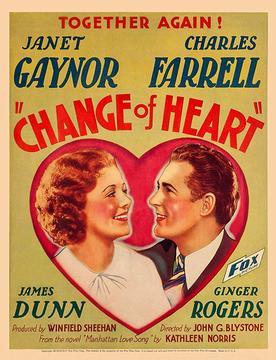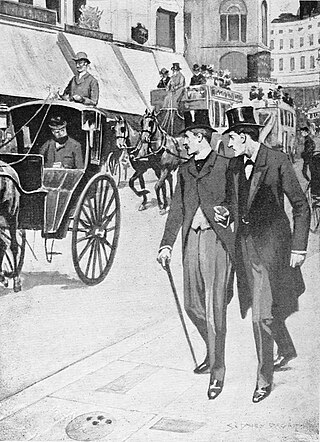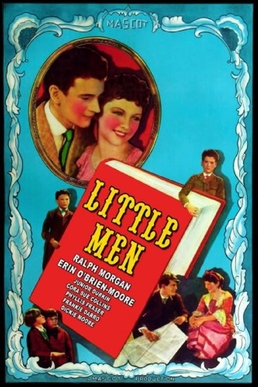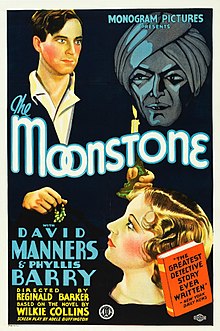
The Moonstone: A Romance by Wilkie Collins is an 1868 British epistolary novel. It is an early example of the modern detective novel, and established many of the ground rules of the modern genre. Its publication was started on 4 January 1868 and was completed on 8 August 1868. The story was serialised in Charles Dickens's magazine All the Year Round. Collins adapted The Moonstone for the stage in 1877.

Change of Heart is a 1934 American pre-Code drama film starring Janet Gaynor, Charles Farrell, James Dunn, and Ginger Rogers. The movie, about a quartet of college chums who all move to 1934 New York City, was written by James Gleason and Sonya Levien from Kathleen Norris's novel, Manhattan Love Song and directed by John G. Blystone.

Jameson Thomas was an English film actor. He appeared in more than 80 films between 1923 and 1939.

Gustav von Seyffertitz was a German film actor and director. He settled in the United States. He was born in Haimhausen, Bavaria, and died in Los Angeles, California, aged 81.

The Dead Eyes of London is a 1961 West German black and white crime film directed by Alfred Vohrer and starring Joachim Fuchsberger, Karin Baal and Dieter Borsche.

The gentleman detective is a type of fictional character. He has long been a staple of crime fiction, particularly in detective novels and short stories set in the United Kingdom in the Golden Age. While not necessarily aristocracy, the heroes of these adventures are often members of the British gentry or gentlemen by conduct. They are sometimes contrasted with professional police force detectives from the working classes.

Barbed Wire is a 1927 American silent romance film set in World War I. It stars Pola Negri as a French farmgirl and Clive Brook as the German prisoner of war she falls in love with. The film was based on the 1923 novel The Woman of Knockaloe by Hall Caine. Unlike the original novel, which is set at the Knockaloe internment camp in the Isle of Man, the film takes place in Normandy, France. Some plot alterations were made in the adaptation, including most importantly the insertion of a happy ending.

Mystery Liner is a 1934 American Pre-Code film directed by William Nigh, starring Noah Beery, Sr., and based on an Edgar Wallace story originally published in the Saturday Evening Post in 1924. The film was entered as a feature attraction at the 1934 International Exhibition of Cinematographic Art in Venice, Italy, the forerunner of the Venice Film Festival.

The Moonstone is a 1915 silent film directed by Frank Hall Crane. The film stars Eugene O'Brien as Franklin Blake, Elaine Hammerstein as Rachel Verinder, Ruth Findlay as Rosanna Spearman, among others.

Little Men is a 1934 American feature film based on Louisa May Alcott's 1871 novel Little Men, starring Ralph Morgan and Erin O'Brien-Moore, directed by Phil Rosen, and was released by Mascot Pictures.

The Source is a lost 1918 American drama silent film directed by George Melford and written by Monte M. Katterjohn and Clarence Budington Kelland. The film stars Wallace Reid, Ann Little, Theodore Roberts, Raymond Hatton, James Cruze, Noah Beery, Sr. and Nina Byron. The film was released on September 8, 1918, by Paramount Pictures.

The Moonstone is a television drama series based on the 1868 novel The Moonstone by Wilkie Collins. It was broadcast in two parts in 1996.

Rachel Verinder is a character in Wilkie Collins' 1868 novel The Moonstone. Despite being the heroine, the story is never related from her viewpoint, as it is in turn from the other main protagonists, leaving her character always seen from the outside.
Miss Drusilla Clack is a character, and part-narrator, in Wilkie Collins' 1868 novel The Moonstone.
Godfrey Ablewhite is a character in Wilkie Collins' 1868 novel The Moonstone. A vocal philanthropist, he is one of the rival suitors of Rachel Verinder, to whom he is briefly engaged before his mercenary motives are revealed.
Ezra Jennings is a character, and part-narrator, in Wilkie Collins' 1868 novel The Moonstone. Ill-favoured, and of ill repute, he is ultimately responsible for solving the mystery of the Moonstone's theft, and so for reuniting the hero with the heroine, Rachel Verinder.

The Moonstone is a daytime drama series produced by King Bert Productions for BBC One. It is an adaptation of the Wilkie Collins 1868 novel of the same name described by T.S. Eliot as the first and greatest of English detective novels. It stars Josh Silver and John Thomson.

The Woman in White is a British mystery television series adapted from the novel of the same title by Wilkie Collins. It first aired on BBC 2 in five parts between 14 April and 12 May 1982.

The Moonstone is a British mystery television series adapted from the 1868 novel The Moonstone by Wilkie Collins. It aired on BBC 1 in five episodes between 16 January and 13 February 1972. It subsequently aired in America on PBS-TV's Masterpiece Theatre between 10 December 1972 and 7 January 1973.

Sergeant Richard Cuff is a fictional character in Wilkie Collins' 1868 novel The Moonstone. He represents one of the earliest portrayals of a police detective in an English novel.


















